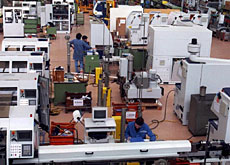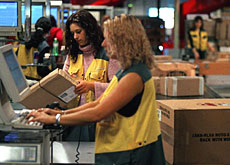Credit Suisse sees delayed economic recovery

Credit Suisse has warned that the Swiss economy is set to stagnate into 2004, adding that the initial spark of recovery must come from foreign demand.
Economic researchers at Switzerland’s second-largest bank said on Thursday that the forces of economic recovery appeared to be “slumbering”.
Credit Suisse forecast that Switzerland’s economy would grow by a modest one per cent in 2004, after a 0.4 per cent decline this year.
The growth forecast is more conservative that recent predictions by the Basel Economics research group (1.3 per cent) and Switzerland’s largest bank, UBS (1.9 per cent).
“The Swiss economy is now in stagnation. In the first half of the year there was a recession,” chief economist Alois Bischofberger told swissinfo.
“I expect this stagnation to continue into the beginning of 2004 and then the economy should recover,” he added.
Driving force
Bischofberger said that private consumption, which accounts for 60 per cent of gross domestic product (GDP), made a positive contribution to growth in the first six months of 2003. But this could not be viewed as a real driving force any more.
“We are dependent on exports, on foreign demand, and I expect that demand to accelerate not only because of an acceleration in the United States and some Asian countries, but also due to some improvement in the European economic picture,” he commented.
Private consumption is expected to grow by 0.5 per cent this year and next – about half the long-term potential rate.
“Of course it would be better if private consumption grew more rapidly,” commented Bischofberger.
“But given relatively low nominal wage increases of an average one per cent, an inflation rate of around 0.7 per cent, and with an increase in healthcare and insurance costs, the increase in disposable income will be very moderate.”
Job security
Credit Suisse said it was therefore not surprising that the Swiss were rather sceptical about job and income security.
Added to this were fears over the long-term viability of Switzerland’s welfare system.
The bank said that while public debate on this issue might be necessary, it was quite possible that it would unsettle households and prompt a greater tendency to save.
The bank said that when the recovery came, export-orientated industries would benefit the most.
These include the chemicals and pharmaceuticals industries, plastics and metals, papermaking, watchmaking, the manufacture of precision instruments, and medical and optical equipment.
The engineering industry is expected to follow the pack after a short delay.
Modest outlook
“I think the main reason [for the one per cent forecast) is our relatively moderate outlook for the global economy… There are huge imbalances in the world economy – not least in the US – that will have to be corrected,” said Bischofberger.
“This correction will probably lead to a weaker dollar, to higher interests in the US and to decreasing demand from there, so these global imbalances make us perhaps a little more hesitant than some of our colleagues,” he added.
Credit Suisse declined to suggest a growth figure for the Swiss economy in 2005 because of continuing global uncertainties.
“But overall I expect the economy to grow faster in 2005 than in 2004,” said Bischofberger.
In another forecast published on Thursday, the Swiss private bank, Julius Bär, said the biggest sparks for growth in 2004 would come from the US, Japan and the emerging economies.
But the bank was more upbeat in its predictions for Switzerland, saying GDP would grow by 1.2 per cent.
swissinfo, Robert Brookes in Zurich
Credit Suisse is forecasting economic growth in Switzerland of one per cent in 2004, after a decline of 0.4 per cent this year.
It says that foreign demand will provide the initial spark of recovery.
The bank believes that private consumption cannot be seen as a real driving force any more.
Credit Suisse’s 2004 forecast sees unemployment at 4%, inflation at 0.7%, private sector consumption at 0.5% and public sector consumption at 1%.
It is predicting that exports of goods and services will rise by 1.4%, while imports will increase by 0.8%.

In compliance with the JTI standards
More: SWI swissinfo.ch certified by the Journalism Trust Initiative













You can find an overview of ongoing debates with our journalists here . Please join us!
If you want to start a conversation about a topic raised in this article or want to report factual errors, email us at english@swissinfo.ch.